Sandwich
 From Conservapedia
From Conservapedia A sandwich in the strictest sense is the name given to a popular food item consisting of one or more fillings (such as meat, cheese, or vegetables) placed between two slices of bread[1]. The beauty of the sandwich is that it is not only portable - it can be taken and consumed anywhere, from the table to the car to the work place - but the possibilities for fillings are almost endless, with the bread keeping the mess contained.
Contents
History[edit]
Bread is among mankind's oldest prepared foods, and doubtless it was combined with meats, stews, or other foods among many peoples and cultures worldwide, including as a means of containing and holding the other items. It is known that the pita - a type of bread with origins in the Middle East - had then as now an ability to form a pocket when baked, which would be filled with meat, vegetables, and sauces to suit the consumer. In pre-Columbian Mexico the tortilla was the staple bread, and often wrapped around other added ingredients.
The historian Edward Gibbon, best known for his monumental Decline and Fall of the Roman Empire, kept a journal of his life, and wrote down the oldest written reference to food described as a sandwich during a gentlemen's social club for the evening of November 24, 1762:
- "I dined at the Cocoa Tree with Holt... that respectable body, of which I have the honor of being a member, affords every evening a sight truly English. Twenty or thirty, perhaps, of the first men in the kingdom, in point of fashion and fortune, supping at little tables covered with a napkin, in the middle of a coffee-room, upon a bit of cold meat, or a sandwich, and drinking a glass of punch."[2]
At roughly the same time, a French writer named Pierre-Jean Grosley toured Britain and recorded daily life in his Londres[3] (English title: A Tour to London). Grosley also described a sandwich, and elected to clearly state that it was named for someone:
- "A minister of state passed four and twenty hours at a public gaming-table, so absorpt in play, that, during the whole time, he had no subsistence but a piece of beef, between two slices of toasted bread, which he eat without ever quitting the game. This new dish grew highly in vogue, during my residence in London; it was called by the name of the minister who invented it."[4]
The "minister of state" Grosley referred to as the sandwich's namesake was John Montagu, a aristocratic British national, First Lord of the Admiralty, the sponsor of Captain James Cook on his voyages of exploration, and the 4th Earl of Sandwich[5]. As described above, Montagu was supposedly a very passionate card player who, according to the legend, ate while playing the game. Rather than get his cards greasy, Montagu had ordered slices of salted beef placed between two slices of bread; his fellow players noticed, of which they in turn requested "to have the same as Sandwich",[6]. Later biographers would reject the gambling legend; Montague was known to be a workaholic, and it was much more likely that he had the sandwich ingredients brought to his desk and assembled in order not to interrupt his work[7].
Sandwiches are mentioned in the English literature from about 1762 onward, initially as a snack at nightly men's societies. In the 19th century the sandwich became a popular intermediate meal, especially during tea. Moreover, it was in any case a typical English picnic and was considered the best food for rail travel, and still often offered on trains and on airplanes today. In the late 19th century it appeared cut and quartered in social gatherings and private clubs as small snack items; Italian immigrants would bring with them the concept that it was the perfect "working man's lunch" due to its size and portability, an idea which would quickly catch on and spread. And during the 20th century, the sandwich would spread world-wide and be sold by the billions, under such names as Subway, McDonald's, White Castle, Geno's, and many others.
| Image | Sandwich | Remarks |
|---|---|---|
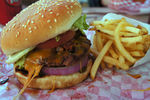 |
|
Fried or grilled patty of ground beef, placed within a sliced bun. Originating with a style of cooked beef in Hamburg, Germany, the hamburger as we know it is based off several competing claims around the turn of the 20th century, with the most likely inventor a Danish immigrant named Louis Lassen in New Haven, Connecticut in 1900.[8][9] Since then the hamburger and its variants - thanks to fast food restaurants - has become one of the largest-selling and most recognizable sandwiches worldwide.[10][11] |
 |
|
Split long roll, filled with meats, vegetables, cheese and condiments. Variously known as "hoagie", "grinder", "hero", "wedge" and others, the submarine had its origins with the Italian immigrant communities in the northeastern United States prior to 1900.[12][13] |
 |
|
A loose mixture of fried ground beef, tomato-based sauces, onions and other seasonings, placed within a sliced bun. A sandwich meant to be a mess, the Sloppy Joe was the creation of a cook named Joe, in Sioux City, Iowa, about 1930, with the name possibly coming from a Key West, Florida bar that originally had no connection to the sandwich.[14] |
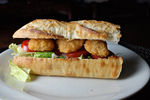 |
|
A Louisiana staple, usually consisting of roast beef or fried seafood, set within a sliced New Orleans baguette. It originated with the "poor boys" of the French Quarter; depending on the story they were either dockyard workers and farmers or strikers around 1929.[15][16] |
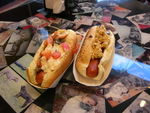 |
|
Sandwich made by inserting a frankfurter sausage into a small roll split lengthwise. A pork and/or beef sausage with its origins in 13th century Frankfurt, Germany; it would take a German immigrant in St. Louis, Missouri to combine both roll and sausage in 1880. The name itself would be allegedly coined at the Polo Grounds, New York City, during a Giants baseball game[17], with an associated legend about a failed attempt at spelling the word "dachshund" when advertising the sandwich[18]. |
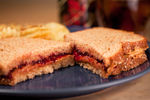 |
|
Peanut butter spread over a slice of bread, covered with fruit jelly or preserves, then topped with a second bread slice. Popular as a children's snack, the PB&J was written about as early as 1901.[19] |
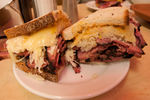 |
|
Hot sandwich consisting of corned beef, sauerkraut, Swiss cheese, Russian dressing, served between two slices of rye bread. The Reuben and its variants trace their origins to Arnold Reuben's delicatessen in New York City, ca. 1914. |
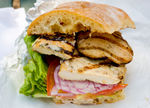 |
|
Hot sandwich consisting of a grilled or fried chicken breast. This sandwich first appeared in 1936 at the Booker T Café in Topeka, Kansas; Truett Cathy would create his version ten years later, beginning the well-known Chick-Fil-A restaurant chain[20]. |
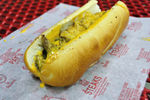 |
|
Thin slices of fried beef steak, onions, and melted cheese, served within a long roll. Pat and Harry Oliveri are credited with creating this popular regional sandwich in Philadelphia, Pennsylvania, in the 1930s.[21] |
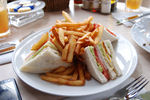 |
|
Simple sandwich made with small amount of meat, lettuce and/or tomato, and cheese, within two slices of white bread, and usually served cut in half or quartered. It originated with the social clubs of the northeastern United States starting in 1894.[22] |
 |
|
Hot sandwich consisting usually one kind of meat, such as pork, beef, chicken, etc., in which the meat has been slow smoked over a wood or charcoal fire for at least several hours. Although barbecuing has a Taino/Caribbean origin noted when Europeans reached the New World in 1492[23], the first sandwich may have been made from pulled pork in a Memphis, Tennessee restaurant in 1922[24]. |
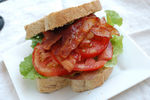 |
|
Simple sandwich made with bacon, lettuce, and tomato, and served within two slices of toasted white bread. A type of club sandwich that may have been made prior to 1900, the BLT as it is called was referenced ca. 1920.[25] |
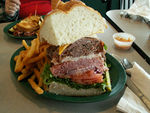 |
|
Very tall sandwich to the point of being almost impossible to eat; filled with one to several kinds of meat, vegetables, condiments, and additional slices of bread. The 1936 creation of Chic Young for his comic strip Blondie, it was the snack of choice for his character Dagwood Bumstead.[26] |
References[edit]
- ↑ https://www.merriam-webster.com/dictionary/sandwich
- ↑ https://books.google.com/books?id=B_8TAAAAQAAJ&pg=PA167&lpg=PA167&dq=edward+gibbon+journal+nov+24+1762&source=bl&ots=_tXg6ZbzLl&sig=ACfU3U2h6-rAWcK2E1tuYZOSY4xzPorrvA&hl=en&ppis=_e&sa=X&ved=2ahUKEwikm820pvfmAhXpg-AKHWDODhoQ6AEwFXoECA4QAQ#v=onepage&q&f=false
- ↑ https://play.google.com/store/books/details?id=vIs_AQAAMAAJ&rdid=book-vIs_AQAAMAAJ&rdot=1
- ↑ https://www.pbs.org/food/the-history-kitchen/history-sandwich/
- ↑ https://www.thevintagenews.com/2018/01/13/sandwich-origin-2/
- ↑ https://www.bbc.com/news/uk-england-kent-18010424
- ↑ https://allthatsinteresting.com/john-montagu
- ↑ http://aht.seriouseats.com/2005/08/the-history-of.html
- ↑ https://theculturetrip.com/north-america/usa/articles/a-brief-history-of-the-hamburger/
- ↑ https://www.washingtonpost.com/news/wonk/wp/2016/03/15/the-incredible-thing-about-hamburgers/?utm_term=.7e88bd2170bd
- ↑ http://www.history.com/news/hungry-history/hamburger-helpers-the-history-of-americas-favorite-sandwich
- ↑ https://whatscookingamerica.net/History/HoagieSubmarinePoBoy.htm
- ↑ https://www.bonappetit.com/test-kitchen/ingredients/article/the-origin-of-hoagies-grinders-subs-heroes-and-spuckies
- ↑ http://blog.blueapron.com/a-history-of-the-sloppy-jo/
- ↑ https://www.nytimes.com/2009/11/11/dining/11unit.html
- ↑ http://www.nola.com/entertainment/index.ssf/2017/02/another_bite_at_the_origin_of.html#incart_most-read_celebrities_article
- ↑ https://whatscookingamerica.net/History/HotDog/HDHistory.htm
- ↑ https://www.snopes.com/fact-check/hot-dog/
- ↑ https://www.nytimes.com/packages/html/magazine/2013/innovations-issue/#/?part=pbj
- ↑ https://www.ebony.com/life/chick-fil-a-origin/
- ↑ https://www.foxnews.com/food-drink/2012/04/30/history-philly-cheesesteak.html
- ↑ https://whatscookingamerica.net/History/Sandwiches/ClubSandwich.htm
- ↑ http://bbqconnectionllc.com/pigsontherunbbq/2010/05/brief-history-of-north-carolina-pulled.html
- ↑ http://thesouthernweekend.com/if-youre-looking-an-incredible-bbq-sandwich-in-memphis-you-should-start-with-the-first/
- ↑ http://www.foodtimeline.org/foodsandwiches.html#blt
- ↑ http://www.culinarylore.com/food-history:what-is-a-dagwood-sandwich
See also[edit]
External links[edit]
Categories: [British Inventions] [Fast Foods] [Food]
↧ Download as ZWI file | Last modified: 02/19/2023 12:58:10 | 83 views
☰ Source: https://www.conservapedia.com/Sandwich | License: CC BY-SA 3.0
 ZWI signed:
ZWI signed:
 KSF
KSF